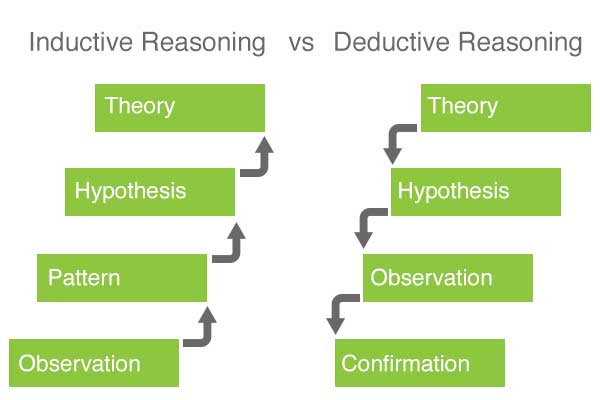Deductive Reasoning
What is a deductive reasoning test?
A deductive reasoning test assesses your ability to use information and logically make decisions, quickly. The test is not only assessing the ‘right’ answers, but also your speed in making the necessary deductions.

A deductive reasoning test is intended to be abstract – it does not need specific job-related skills, nor does it need any culturally specific knowledge.
All the information that you need to answer the question correctly is provided in the test, and there is only one answer that is correct.
What is the difference between inductive and deductive reasoning tests?
These two test types are frequently confused, so let’s clarify the difference between them early on.
Inductive reasoning tests tend to start with an observation, and the candidate has to use that information to detect a pattern and then form a hypothesis. We have some more information about how to prepare for inductive reasoning tests and score well in inductive tests.
Deductive reasoning, on the other hand, is looking for you to take information and follow logic to find the correct answer.
Why do employers use deductive tests?
The deductive reasoning test demonstrates a candidate’s ability to analyse and interpret information to make a logical deduction. This type of test is generally more relevant for highly skilled roles, but is useful for almost every job application.
Recruiters and employers use deductive reasoning tests as part of the application process – usually before an interview – because this type of test is easy to apply on a range of candidates, no matter their specific knowledge or skill set.
If the role you are applying for has a degree of problem-solving, deductive reasoning tests can demonstrate your critical thinking abilities, as well as your skill in making decisions quickly based on information given.
Common deductive test publishers
Although big multinational companies may have their own in-house tests, in the UK there are two main publishers:
SHL is the largest test publisher in the UK, and its deductive reasoning tests the most popular for job applications. Typically, SHL tests last about 18 minutes, with 20 questions split into three sections:
- Verbal (sentences)
- Image-based (abstract and/or numerical)
- Block of text
Kenexa is part of IBM and another large test publisher. The test structure is similar to SHL, in that there are 20 timed questions to answer, and you must use logic to deduce the correct one.
Deductive reasoning skills – and how to improve them
There are three parts to being successful at deductive reasoning. The first is to be able to quickly read and understand the information given. You then need to analyse and interpret the information given, so that you can make a logical deduction.
To improve your deductive reasoning skills, you need to firstly simplify the information that you have been given. You are not expected to question the veracity of the data – whether it is written or mathematical – since the answer is provided within the question.
Making it simple, reducing it to easy-to-understand points and then applying logic to them is the easiest way to make the correct deduction.
The deductive reasoning test is not designed to be easy, because then it would lack usefulness as an assessment tool. However, knowing that the answer you need is provided for you and needs no pre-existing knowledge should help you make the right choice.
Whether you have to draw a conclusion, identify strengths and weaknesses in a sentence, or complete an incomplete scenario, simplify it. With the information simplified, it should be straightforward to follow the logic to the correct conclusion.
How best to prepare for a deductive test
Deductive reasoning tests are not skills tests. They are not looking for your ability to perform job-related tasks – they are aptitude tests to showcase your ability to make logical deductions and analyse information quickly.
That said, preparation for any type of test is important to ensure that you can perform well.
Practice
Practicing tests before taking them is a great way to prepare. Knowing the format, understanding the way questions might be phrased, and getting explanations of answers makes a real difference in understanding.
If you get a question wrong in a practice test, you can see the logic in the correct answer through the explanation.
Don’t just practice once, either. Multiple tests are a great idea, and if you know which test publisher the recruiter is using, that is even better. Reach out and ask before the test, so you can practice with the specific publisher.
Timing
Deductive reasoning tests are timed. This can put additional pressure on you when you are taking the tests, so practicing on timed tests is important.
If you aren’t taking a timed test, then think about setting up a timer for yourself – in most tests you will have around one minute per question.
Forget Pre-Existing Knowledge
This is a really important point in your success, and something that might need some extra thought. As previously mentioned, deductive reasoning tests are meant to be abstract, and like verbal reasoning tests, they do not presume any pre-existing knowledge.
When you are practicing, be sure to make a point of only using the information you are given in the question. If you are reaching or guessing, you are not using the information correctly.
